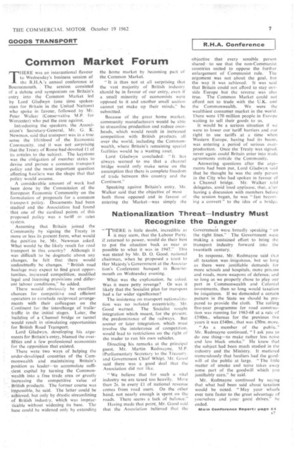Common Market Forum
Page 9

If you've noticed an error in this article please click here to report it so we can fix it.
THERE was an international flavour to Wednesday's business session of the R.H.A.'s annual conference at Bournemouth. The session consisted of a debate and symposium on Britain's entry into the Common Market led by Lord Gladwyn (one time spokesman for Britain in the United Nations) who spoke in favour, followed by Mr. Peter Walker (Conservative M.P. for Worcester) who put the case against.
Introducing the speakers, the Association's Secretary-General, Mr. G. K. Newman. said that transport was in a true sense the lifeblood of _ the Economic Community, and it was not surprising that the Treaty of Rome had devoted 11 of its articles to the subject. The keystone was the obligation of member states to devise and pursue a common transport policy and the most important question affecting hauliers was the shake that that policy would assume.
A considerable amount of work had been done by the Commission of the European Economic Community on the formulation of proposals for a common transport policy. Documents had been • studied and the Association had found that one of the cardinal points of this proposed policy was a tariff or rates system. . Assuming that Britain joined • the Community by signing the Treaty in more or less its present form, what would the position be. Mr. Newman asked. What would be the likely result for road tranSport in this country? Although it was difficult to he dogmatic about any changes, he felt that there would undoubtedly be changes. "British road haulage may expect to find great opportunities, increased competition, modified legal and licensing provisions and different labour conditions," he added.
There would obviously be excellent chances for competitive and efficient operators to conclude reciprocal arrange' ments with their colleagues on the Continent for the interchange of trailer traffic in the initial stages. Later; the . building of a Channel bridge or tunnel • would result in stimulating opportunities for British Road Transport, Lord Gladwyn, developing his arguments for Britain's entry, blamed the overfifties and a few professional economists for the opposition that existed.
There were two ways of helping the under-developed countries of the Commonwealth and maintaining Britain's position as leader—to accumulate sufficient capital by turning the Commonwealth into a free trade area or greatly increasing the competitive value of . . British products. The former course was impossible, he said. The latter could be . achieved, but only by drastic streamlining of British industry, which was impracticable without widening its base. The base could be widened only by extending the home market by becoming part of the Common Market.
" It is thus not at all surprising that the vast majority of British industry should be in favour of our entry, even if a small minority of economists were opposed to it and another small section cannot yet make up their minds," he submitted.
Because of the great home market. community manufacturers would be able to streamline production and reduce overheads, which would result in increased competition with British products all over the world, including the Commonwealth, where Britain's remaining special facilities would be a wasting asset.
Lord Gladwyn concluded; "It has always seemed to me that a channel bridge would only make sense on the assumption that there is complete freedom of trade between this country and the Continent."
Speaking against Britain's entry, Mr. Walker said that the objective of most both those opposed and in favour of entering the Market—was simply the
objective that every sensible, person shared—to see that the non-Communist countries united to oppose the further enlargement of Communist rule. The argument was not about the goal, but the way it was achieved_ It was said that Britain could not afford to stay outside Europe but the reverse was also true. The Common Market could not afford not to trade with the U.K. and the Commonwealth. We were the wealthiest consumer 'market in the world. There were 170 million people in Europe waiting to sell their goods to us.
It would be a serious situation if we were to lower our' tariff barriers and our right to use tariffs : at a time when Western Europe, having had its boom, was entering a period of serious overproduction. Once the Treaty was signed, never again could Britain enter into trade agreements outside the Community.
Answering questions after the arguments had been put, Lord Gladwyn said that he thought he was the only person in the City who had spoken in favour of a Channel bridge. Mr. Walker told delegates, amid loud applause, that, a:*ter having a discussion with members before the session began, he was " fast becoming a convert" to the idea of a bridge.




































































































































